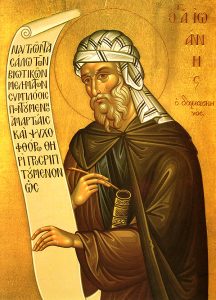 Also, today we liturgically recall St John Damascene on the same day we commemorate St Barbara.
Also, today we liturgically recall St John Damascene on the same day we commemorate St Barbara.
The feast of Christmas is a theological feast. It is a celebration of God incarnate, taking our nature to perfect it. Jesus commanded us poor mortals to “be perfect, just as your heavenly Father is perfect” (Matthew 5:47). How can we do this – only by imitating our Lord Jesus Christ, who is perfect God and perfect man, as we see in this passage from the Damascene:
“For the divine Word was not made one with flesh that had an independent pre-existence, but taking up his abode in the womb of the holy Virgin, he unreservedly in his own subsistence took upon himself through the pure blood of the eternal Virgin a body of flesh animated with the spirit of reason and thought, thus assuming to himself the first-fruits of man’s compound nature, himself, the Word, having become a subsistence in the flesh. So that he is at once flesh, and at the same time flesh of God the Word, and likewise flesh animated, possessing both reason and thought.
Therefore we speak not of man as having become God, but of God as having become Man. For being by nature perfect God, he naturally became likewise perfect man: and did not change his nature nor make the dispensation an empty show, but became, without confusion or change or division, one in subsistence with the flesh, which was conceived of the holy Virgin, and animated with reason and thought, and had found existence in him, while he did not change the nature of his divinity into the essence of flesh, nor the essence of flesh into the nature of his divinity, and did not make one compound nature out of his divine nature and the human nature he had assumed.” (On the Orthodox Faith, 3.2, www.Orthodox.net).
As a result of his theology of the Incarnation, John was able to defend with strength the importance of icons. If, in Jesus, God took a human face, then we can make images of him. We pray, holy Father John, make our Christmas a feast of perfection, for “God is with us.”